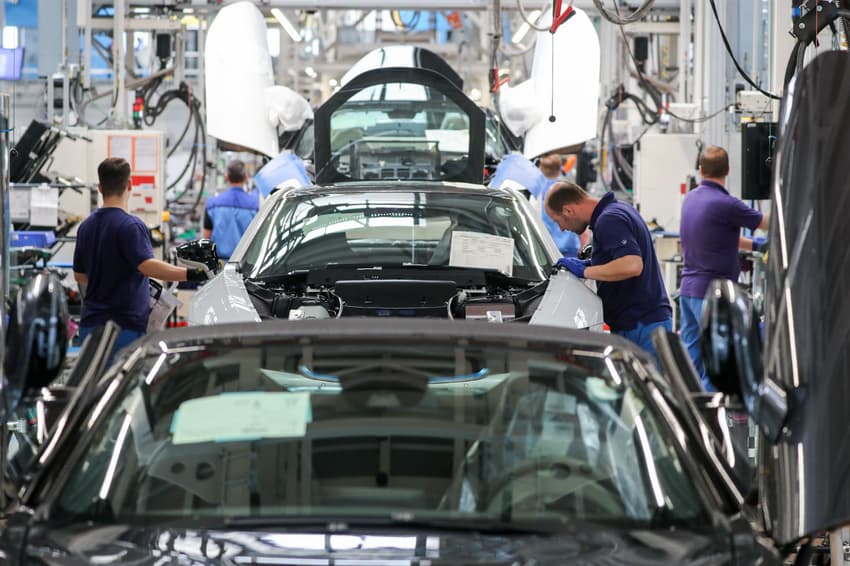Why German taxpayers don't pocket their own cash until mid-July

What does an average household in Germany surrender to the state every year? According to new research, employees don't work for their own wallet until mid-July.
Germans have to give up more than half – 53.7 percent – of their income to the state in 2019.
That's according to research by the lobby group the German Taxpayers Federation (BdSt) who pinpointed Monday as 'Steuerzahlergedenktag' (taxpayer memorial day) – the moment that Germans work for themselves again.
Converted to the year, it means the entire income earned by taxpayers and contributors before this date is – purely theoretically – transferred to the state in the form of taxes.
But from 9.56pm on Monday, employees can pocket cash for themselves again.
The BdSt made the calculations based on representative household surveys conducted by the Federal Statistical Office.
Tax high in Germany
According to the group's research, of every euro earned just 46.3 cents goes to the employee.
In fact, Germans are particularly burdened when it comes to tax compared to other countries. A report by the OECD published earlier this year revealed that Germany is second only to Belgium when it comes to high tax rates.
The Organization for Economic Cooperation and Development (OECD) compared 35 developed countries around the world.
The BdSt provided a breakdown of how taxes of employees in the Bundesrepublik are divided up: the largest part – 31.4 cents of every euro – is spent on social security contributions.
The value added tax (VAT) makes up 4.3 cents of every euro, while wage and income tax as well as the solidarity surcharge make up 13 cents.
READ ALSO: The ultimate guide to paying taxes in Germany
In addition, there are other taxes such as property tax, motor vehicle tax, insurance tax – and even coffee tax. In addition, Germans also have to pay the electricity levy and the television licence fee contribution (Rundfunkbeitrag), which amounts to 0.7 cents per euro.
Last year, the so-called taxpayers' memorial day was three days later, according to a report in the Frankfurter Allgemeine Zeitung published Friday. That's because at the turn of the year contributions to social security were reduced and income tax adjusted to reflect inflation.
READ ALSO: What you need to know about filing your tax return in Germany
Comments
See Also
Germans have to give up more than half – 53.7 percent – of their income to the state in 2019.
That's according to research by the lobby group the German Taxpayers Federation (BdSt) who pinpointed Monday as 'Steuerzahlergedenktag' (taxpayer memorial day) – the moment that Germans work for themselves again.
Converted to the year, it means the entire income earned by taxpayers and contributors before this date is – purely theoretically – transferred to the state in the form of taxes.
But from 9.56pm on Monday, employees can pocket cash for themselves again.
The BdSt made the calculations based on representative household surveys conducted by the Federal Statistical Office.
Tax high in Germany
According to the group's research, of every euro earned just 46.3 cents goes to the employee.
In fact, Germans are particularly burdened when it comes to tax compared to other countries. A report by the OECD published earlier this year revealed that Germany is second only to Belgium when it comes to high tax rates.
The Organization for Economic Cooperation and Development (OECD) compared 35 developed countries around the world.
The BdSt provided a breakdown of how taxes of employees in the Bundesrepublik are divided up: the largest part – 31.4 cents of every euro – is spent on social security contributions.
The value added tax (VAT) makes up 4.3 cents of every euro, while wage and income tax as well as the solidarity surcharge make up 13 cents.
READ ALSO: The ultimate guide to paying taxes in Germany
In addition, there are other taxes such as property tax, motor vehicle tax, insurance tax – and even coffee tax. In addition, Germans also have to pay the electricity levy and the television licence fee contribution (Rundfunkbeitrag), which amounts to 0.7 cents per euro.
Last year, the so-called taxpayers' memorial day was three days later, according to a report in the Frankfurter Allgemeine Zeitung published Friday. That's because at the turn of the year contributions to social security were reduced and income tax adjusted to reflect inflation.
READ ALSO: What you need to know about filing your tax return in Germany
Join the conversation in our comments section below. Share your own views and experience and if you have a question or suggestion for our journalists then email us at [email protected].
Please keep comments civil, constructive and on topic – and make sure to read our terms of use before getting involved.
Please log in here to leave a comment.